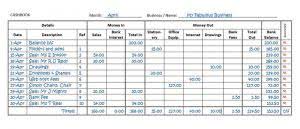
Sometimes there is confusion between what a bookkeeper does and what an accountant’s role is, and even though the two complement each other, their tasks and responsibilities are quite different. Make sure your accounting team is not only qualified, but on task at all times and it all starts with a proper bookkeeper description in your recruiting manual. Even if you have the financial knowledge to manage your books, it is better to spend your time on more important business development activities. The bottom line is that a bookkeeper is an invaluable member of your team, keeping your finances on track. Although any small business would benefit from a bookkeeper, they would see even more benefits with a CPA-led bookkeeper.

Do I need bookkeeping software?

Accounts receivable (AR) is the money your customers owe you for products or services they bought but have not yet paid for. It’s important to track your AR to ensure you receive payment from your customers on time. Generally, if your assets are greater than your liabilities, your business is financially stable. Note that certain companies, such as those in service-based industries, may not have a lot of equity or may have negative equity. A lot goes into it—from managing payables and receivables to balancing books. But what might seem like an overwhelming task isn’t so bad when you break it down to the bookkeeping basics.
How Webisoft Clients Manage Bookkeeping
Additionally, there may be other responsibilities based on the unique needs of your business. For example, a bookkeeper may be required to learn a specific accounting software system or participate in certain meetings. Learn how to build, read, and use financial statements for your business so you can make more informed decisions. There are key differences between bookkeepers and accountants that you want to know before hiring a financial professional. This includes calculating wages, figuring out tax deductions and other withholdings, and making sure payments go out on time. Staying up-to-date with payroll rules helps the business pay people correctly and handle payroll taxes properly.

What does a bookkeeper do? Duties + small business benefits

An accounting ledger is a book or system you use for recording and classifying financial transactions. Start by deciding on the system you want to use, whether it’s an online program, paid software or a spreadsheet. Next, set aside a dedicated time either weekly or biweekly to review your bookkeeping, reconcile https://www.bookstime.com/articles/minimum-wage-and-overtime-pay transactions and complete necessary data entry.
These resources assist in managing subsidiary accounts, processing financial transactions, and generating reports for analytical review against industry benchmarks. Regularly using these tools allows for systematic reconciliation of accounts and ensures catch-all monitoring of a company’s fiscal health. Bookkeepers are What is bookkeeping tasked with ensuring that all financial records comply with established accounting standards and procedures.
What Does a Certified Bookkeeper Do?
- This helps to identify which department or person is spending how much of the corporate money, which reduces wasteful expenditure.
- So even if you have accounting software, odds are, you still need a bookkeeper to manage the software, enter data, file reports, identify errors and keep everything current.
- As financial custodians, bookkeepers also engage in reconciliations to validate the integrity of accounting data.
- They record transactions, maintain ledgers, manage invoices, track payments, and reconcile accounts to resolve any discrepancies.
- Bookkeeping is a valuable tool for any business, but how exactly can a professional bookkeeper help ensure a business is running smoothly?
It’s important to remember that this equation is always true in bookkeeping and accounting, when best practices are followed. Why it’s always true will become clear once you understand those three accounts. This is where a large percentage of the bookkeeper’s work takes place.
- A bookkeeper is a finance professional who handles the daily recording of financial transactions for a business.
- You are probably also experiencing more sales and incurring more expenses, increasing your accounts payable and receivable workload.
- As a bookkeeper, you can link your client’s bank account and credit card (or multiples of each) to QuickBooks Online or QuickBooks Desktop–I prefer the online version.
- In that case, you may find that managing payroll is an added task that can be delegated to bookkeepers since they are already handling the financial aspect of your business.
- To become an accountant, you typically need a bachelor’s degree in accounting or a related field.
Learn what it is and how to hire the right remote bookkeeper for your business. If you’re ready to pass over the bookkeeping responsibilities of your business, we have talented Virtual Bookkeepers we can’t wait to match with you. This implies that bookkeeping involves not only filling numbers in spreadsheets, as some people believe it to be. Bookkeeping requires good senses and excellent skills that one can learn over time.

If you also have a trained accountant working for you, then you may be able to pear down the responsibilities of a bookkeeper in order to save some cash. Additionally, the IRS said that bookkeeping is needed for your what exactly does a bookkeeper do tax returns. They noted that business records must be available at all times for inspection by the IRS, and that they may ask to have specific items explained. Keeping updated books can speed up their examination and ensure accuracy of tax returns, according to the IRS. Just as you may keep track of personal expenses and income to manage your budget, businesses rely on bookkeeping to monitor their financial health and plan for the future.

